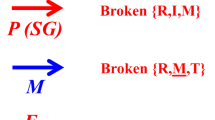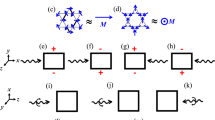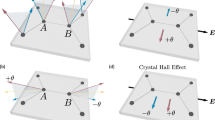Abstract
RECENT researches on magnetism tend to suggest that the negative electron may be a magneton or unitary electromagnet as well as a unitary electric charge, consisting, that is, of an anchor-ring of negative electricity in rotation about its axis of symmetry. Such a magneton would behave mechanically like a gyroscope; magneto-gyroscopic effects have been previously considered and observed in relation to ferromagnetic bodies on the assumption that the ferro-magnetism is due to electrons in orbital motion as a whole. Wider conclusions can be drawn, however, if the magneton hypothesis is adopted, and the deductions are of importance, not only in the theory of atomic and crystal structure, but also in relation to cosmical magnetism. The following notes describe a few of the more important consequences; a detailed account of the theory and of some experiments designed to test its validity will be published shortly.
This is a preview of subscription content, access via your institution
Access options
Subscribe to this journal
Receive 51 print issues and online access
$199.00 per year
only $3.90 per issue
Buy this article
- Purchase on Springer Link
- Instant access to full article PDF
Prices may be subject to local taxes which are calculated during checkout
Similar content being viewed by others
Author information
Authors and Affiliations
Rights and permissions
About this article
Cite this article
CHAPMAN, S. Molecular and Cosmical Magnetism. Nature 106, 407–408 (1920). https://doi.org/10.1038/106407c0
Issue Date:
DOI: https://doi.org/10.1038/106407c0
Comments
By submitting a comment you agree to abide by our Terms and Community Guidelines. If you find something abusive or that does not comply with our terms or guidelines please flag it as inappropriate.



